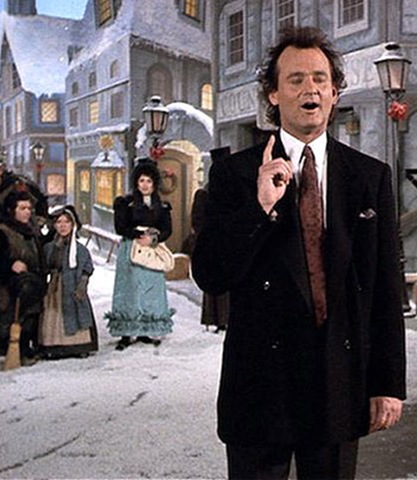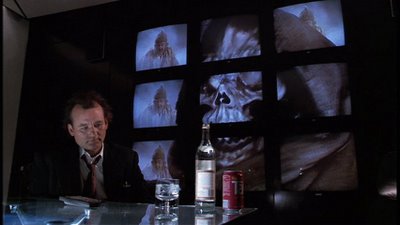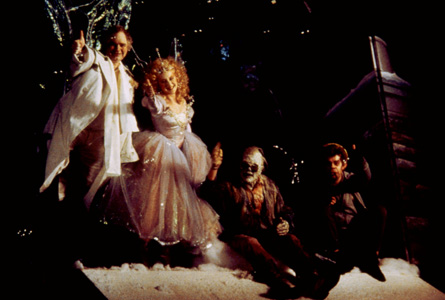From the Chicago Reader (November 25, 1988). — J.R.
SCROOGED
* (Has redeeming facet)
Directed by Richard Donner
Written by Mitch Glazer and Michael O’Donoghue
With Bill Murray, Karen Allen, John Forsythe, Bobcat Goldthwait, Carol Kane, Robert Mitchum, Michael J. Pollard, and Alfre Woodard.
It must have been in the late 50s or early 60s when, as a teenager, I happened across a story in a movie fan magazine, probably Photoplay, about the pop/movie star Fabian. Fabian, the magazine explained, was getting so popular that he couldn’t go out on a date without being besieged by reporters and photographers. Recently, however, he’d eluded them and been able to take out a lovely lady; the magazine was celebrating the event — I swear I’m not making this up — with a two-page spread of photos and captions that chronicled the evening from beginning to end, from the moment he called on his date to the good-night kiss on her doorstep. “An intimate look,” I think they called it.
A comparable game for the gullible is performed by Scrooged, which attempts to obfuscate its own apparatus as thoroughly as that magazine did 20-odd years ago. I know we’re all supposed to be more knowledgeable and therefore more cynical about the media today. But the popular equation that’s currently being made between knowledge and cynicism seems to me an attitude that is every bit as shortsighted as the naivete that cynicism is supposedly an improvement on. In order to fall for Scrooged, one must accept the premise that the commercialization of Christmas is somehow distinct from the movie and its attack on the commercialization of Christmas. But whether audiences fall for Scrooged for naive reasons or for cynical ones doesn’t really matter: the end result is the same.
Consider the overall context. A kind of ersatz Dickens adaptation (in contrast to a genuine Dickens adaptation like Little Dorrit, perhaps the best to date, which will open at the Fine Arts in the weeks ahead) with only a rudimentary relation to its model, Scrooged is one of several Christmas pictures shrewdly released before Thanksgiving in the hopes of reaping benefits throughout the remainder of the year. The others include Ernest Saves Christmas (a sequel to a feature-length spin-off of a TV commercial) and two cartoon features, Oliver & Company and The Land Before Time.

Both of the animated features belong to the Disney tradition in many respects, including their mystifications of sex and class. The Land Before Time has as its hero a young dinosaur named Little Foot, the last of his species, who, after the death of his mother, journeys to a place called the Great Valley to survive. We’re told at the end, after he arrives, that his species continued for many generations, but how this biological feat is pulled off is left to our imaginations. In Oliver & Company — which, like Scrooged, transposes Dickens to a New York setting — a similar sleight of hand resolves without confrontation all of the class differences and resentments that even a loose adaptation of Oliver Twist has to bring up. Fagin becomes human, sympathetic, and non-Jewish — the hapless pawn of the evil waterfront boss he works for — and only the canine pickpockets in his charge are allowed any ethnic identities. Oliver is a stray kitten taken in first by the dogs, then by a wealthy little girl, and the competition between the two for Oliver’s love is magically eliminated before any real contest can develop.
These are the kinds of everyday lies that are usually told to children in Disney features (Oliver & Company actually comes from the Disney studio and apes the late Disney manner of 101 Dalmatians; The Land Before Time comes from Lucas/Spielberg and aspires to the grace of a prehistoric Bambi), and the least that can be said for these two movies is that neither is especially moralistic. Scrooged, on the other hand, purports to take on the moral agenda of A Christmas Carol without sacrificing its yuppie priorities for an instant. This requires a sleight of hand that is a good deal cruder than anything Disney ever attempted, even when he was welcoming Nazi filmmaker Leni Riefenstahl to Hollywood in the mid-30s.
The movie obliges us to take Bill Murray — described in Time as “a master of comic insincerity” — as the youngest network president in the history of television and a modern-day equivalent to Scrooge named Frank Cross. Cross is a selfish tightwad who exploits Christmas to the hilt on his network until a series of ghosts — his network predecessor (John Forsythe), the Ghost of Christmas Past (David Johansen), the Ghost of Christmas Present (Carol Kane), and the Ghost of Christmas Future (a special-effects skeleton) — show him the error of his ways.
What are some of Frank Cross’s errors? He puts on a crass, live TV production of Scrooge on Christmas Eve, and hypes it with a violent promo that gives an old lady a heart attack, an occurrence that delights him for its free publicity. He fires a critical subordinate (Bobcat Goldthwait), a hapless executive who then loses his wife, goes on a bender, and becomes the butt of some humiliating slapstick gags. Frank also decides to give his brother James (John Murray, Bill’s brother) a towel instead of a VCR for Christmas, exploits his black secretary Grace (Alfre Woodard), and ignores the fact that her little boy Calvin (Nicholas Phillips) hasn’t uttered a word since he saw his father killed. He also manages to alienate his compassionate girlfriend Claire (Karen Allen), who helps the needy and homeless, and then refuses to give two bucks to a homeless man (Michael J. Pollard), who subsequently freezes to death.
When Frank finally sees the light and repents, his good works include rehiring and doubling the old salary of his subordinate (who has been firing at him with a shotgun) and putting him in charge of programming. Frank then interrupts his own production of Scrooge in midstream, attacking the audience for watching such a show on Christmas Eve, while the subordinate holds the control booth at gunpoint and humiliates one of Frank’s rivals (John Glover). Frank also apologizes at length on national TV to his brother and to his former girlfriend, who is so delighted she leaves the needy and the homeless. She flags a cab to the studio, where she can join in the delight shared by the vagrant who froze to death, but who is now an ecstatic angel hanging out with the approving ghosts. Frank tells the TV audience that on Christmas they should buy the needy and homeless a sandwich, or maybe a blanket. At this point, the mute Calvin is so overpowered by this show of “goodness” — Frank interrupting a TV special for the sake of elaborate personal messages to his brother and girlfriend, insulting and giving detailed moral instructions to his audience, calling himself a schmuck — that he miraculously chimes in, “And God bless us, every one!” A final rendition of the 1969 Jackie DeShannon hit “Put a Little Love in Your Heart” sums it all up.
In other words, this year’s Christmas message, to paraphrase Chevy Chase, is “I’m Bill Murray, and you’re not.” The puritanical double standard in Scrooged invites us to feel morally superior to both Frank and the TV audience while glibly sharing their jaded tastes on the sly. In his evil period Frank Cross insists on showing the nipples of the dancing girls in Scrooge in order to improve his ratings, which is apparently meant to be different somehow from the movie’s showing the same thing — in order to reveal Frank’s amorality and to win a few fans of its own. Along the way, we get lots of cameos of celebrities or at least recognizable actors playing the needy: Miles Davis performing “We Three Kings” on the street; Michael J. Pollard, Anne Ramsey, and Logan Ramsey in a homeless shelter listening, enraptured, to Frank’s terrible impromptu Richard Burton imitation. With all those luminaries out in the cold, the notion of real homeless people is made quite comfortably remote; all we have to do is buy Michael J. Pollard a sandwich, or drop a coin in Miles Davis’s cup.
There are a few half-funny moments in Scrooged, nearly all of them founded on cruelty: At one point Frank suggests using staples to attach fake antlers to the mice in his Christmas show, and Carol Kane’s Ghost of Christmas Present, dressed like a sugarplum fairy, kicks Frank in the balls and beats him black and blue, adding some tangy S and M to the holiday cheer. (There are also a disembodied eyeball and plenty of decaying flesh for horror movie freaks.) The jokes that aren’t cruel are mainly SCTV or Saturday Night Live staples, such as a TV ad for Bob Goulet’s Old-Fashioned Cajun Christmas, although for a pointed spoof of turning Christmas into coin, Stan Freberg’s 50s record “Green Christmas” has everything in this movie beat by miles.
One may also derive some minimal pleasure from seeing so many familiar faces — from Robert Mitchum to Buddy Hackett to John Houseman — flit across the screen. But the sleaze of Scrooged ultimately tends to tarnish everyone that it touches. The object of the verb in the title isn’t only Bill Murray; it’s the audience — his own self-absorbed reflection — in the bargain.
Published on 24 Sep 2011 in Featured Texts, Featured Texts, by jrosenbaum




